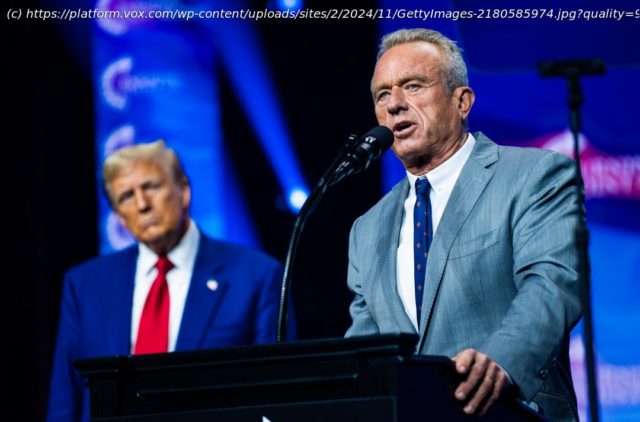Kennedy has promised to overhaul US policies on vaccines, fluoride, food and more. How much can he actually change?
Donald Trump announced Thursday that Robert F. Kennedy Jr. would be his nominee to lead the Department of Health and Human Services, setting the stage for a potentially radical remaking of the nation’s health care.
Kennedy’s nomination was not a surprise. Last month, Kennedy said Trump had promised him control of the department and its many subagencies, which include the Centers for Disease Control and Prevention, the Food and Drug Administration, the National Institutes of Health, the Centers for Medicare and Medicaid, and others. Trump himself pledged during the campaign to let Kennedy “go wild on health.”
It’s a perplexing pick. Kennedy has spent decades spreading anti-vaccination pseudoscience, and the organization he leads, Children’s Health Defense, has been one of the foremost anti-vaccine advocacy groups in the US and abroad. His work in support of a Samoan anti-vaccine group helped fuel a wave of vaccine hesitancy in the island nation, leading to a 2019 measles epidemic that killed 83 people, most of them children.
He’s expressed a range of other conspiracy-laden ideas about health: He says fluoride is industrial waste linked to a range of diseases, and suggested it should be removed from all US water systems. He has speculated that gender dysphoria may result from herbicide exposure and implied mass shootings are linked to antidepressants.
Kennedy does hold other views that align with many scientists: He traces America’s high levels of chronic disease to the widespread availability of highly processed, non-nutritious food, which he and nutrition policy experts blame in part on broken agriculture policy. He’s railed against corruption and conflicts of interest in the FDA’s drug approval process that favor big pharmaceutical companies over the interests of individuals — something economists, scientists, and consumer advocates agree on.
No matter where a person stands on the political spectrum, they can probably find something to agree with Kennedy on. He is the personification of the growing distrust of science and “the public health establishment” felt by many Americans in the post-pandemic era.
HHS secretaries are usually seasoned bureaucrats with lots of experience moving policy through government agencies — a state insurance commissioner in Obama’s case or a tenured pharma executive in Trump’s first term. They typically understand how science is done and what it means for a health intervention to be grounded in evidence.
Kennedy doesn’t have that résumé — far from it. Now he’ll be in charge of much of US health care, which raises the question: How much damage can he actually do in this role?
The answer will depend on a few things. First, he has to be confirmed by the Senate (unless the White House attempts to circumvent that chamber’s constitutional “advise and consent” powers) and Republicans have only a narrow majority. Even if Kennedy is confirmed, Trump has other important health care appointments to make — particularly for CMS, NIH, FDA, and CDC — and those people will hold sway over the administration’s health care agenda too. They could be in the Kennedy vein or, as we have seen with Trump’s foreign policy picks, they could be a mix of the conventional and the iconoclastic.
For now, however, Kennedy’s appointment is a watershed moment that could portend enormous changes to the American health system. Republicans in Congress will control the HHS budget, and Kennedy, if confirmed, could have broad discretion to pursue his Make America Healthy Again agenda with Trump’s blessing. If the Trump administration attempts to remove civil servants across the government, including the health agencies, decades of public health knowledge could be lost at the CDC, FDA, and elsewhere. It is uncertain if the Republican-dominated judiciary would step in to stop any of it.
Here’s what we know about the Trump health department’s plans — and what hurdles may await them.What RFK can — and can’t — do on vaccines, briefly explained
Over the last 30 years, vaccines have saved the lives of more than 1.1 million children in the US alone. Over the same period, they’ve also saved Americans $540 billion in direct health care costs and trillions in social costs. Routine vaccines protect American children from 16 diseases.
Trump himself suggested blocking funding for local schools with vaccine requirements during the campaign, though the federal government has limited authority to do so. Despite Kennedy’s long history of anti-vaccine rhetoric, he said in early November that he wasn’t planning to take anyone’s vaccines away.
“People ought to have choice, and that choice ought to be informed by the best information,” Kennedy said in an interview with NBC News. “So I’m going to make sure scientific safety studies and efficacy are out there, and people can make individual assessments about whether that product is going to be good for them.”
However, a co-chair of Trump’s transition team recently said Kennedy hoped to access federal health data with the goal of proving vaccines are unsafe and pulling them from the American market.
That’s not as easy to do as it sounds.
Undoing the approval of an already approved vaccine would require submitting evidence of harm that meets the FDA’s standards to prove harm, which simply doesn’t exist.






